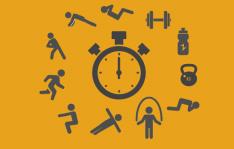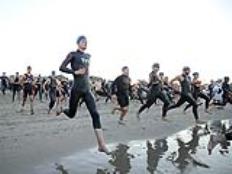5. Practice swimming in water temperatures similar to what you will see on race day and in a safe open water situation. If you are practicing open water swimming before race day, make sure there is a boat or lifeguard available during your workout. Even the most experienced swimmers can have problems. At the very least, get into open water once before race day and better yet is if you can get into open water once per week for the four to eight weeks before race day. Know that it is a normal human response, the mammalian diving reflex, to gasp when the face this cold water. It appears that training can help with this response, conditioning both the body and mind -- you know what to expect when you jump into the water.
6. Warm up on race morning. While there is no clear proof that a warm up can prevent problems, but it certainly won't hurt. If you can get into the water before racing to do some five to 10 minutes of warm up, your body will be prepared for a faster race start.
7. Dry land warm up. If you cannot warm up in the water on race morning, there are a couple of options. One option is to jump into the water and begin swimming slowly to warm-up, just as you would during a regular swim practice. Option two is to do a dry land warm up. This is easily done with rubber stretch cords attached to a tree or a pole. There are several styles of cords available; here is one example of dry land swim cords. You can also go to a medical supply store and purchase rubber tubing and make your own—just skip the paddle portion.
8. Admit when you are having problems. If you feel in trouble during the race, do something about it. Call to a lifeguard for help or swim to one of the safety vessels to take a rest. You must be honest with yourself, it might save your life.
Addressing the major areas of health, fitness, mental preparation and warm-up can help you minimize open water swimming risks. The reality of life and sport is that accidents do happen.
"Life is inherently risky. There is only one big risk you should avoid at all costs, and that is the risk of doing nothing." — Denis Waitley
References: Study by USA Triathlon Swimming Deaths Trouble USA Triathlon OfficialsMore: 5 'I Can't Do a Triathlon Because' Myths Busted
 Search for your next triathlon.
Search for your next triathlon.
- 2
- of
- 2
About the Author










Discuss This Article